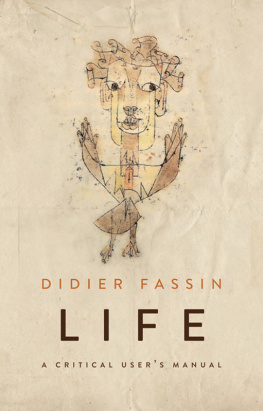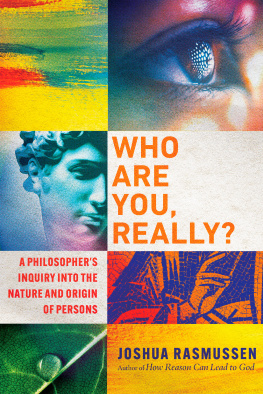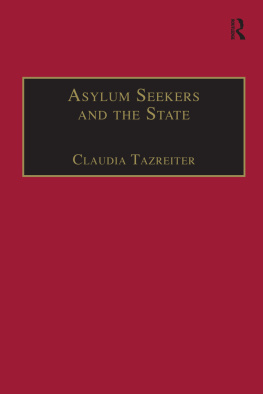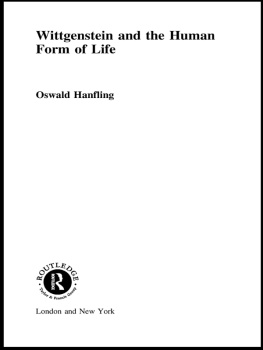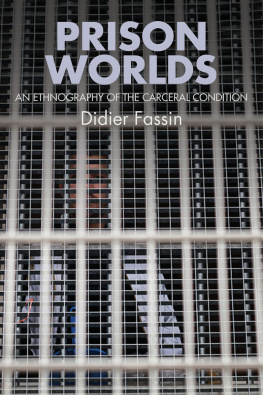
Copyright page
Excerpt from Samuel Beckett, Waiting for Godot copyright 1954 by Grove Press, Inc.; Copyright renewed 1982 by Samuel Beckett. Used in The United States and Canada by permission of Grove/Atlantic, Inc. Any third party use of this material, outside of this publication, is prohibited. Used in the World excluding the United States and Canada by permission of Faber and Faber Ltd.
First published in German as Das Leben: Eine kritische Gebrauchsanweisung, Suhrkamp Verlag, Berlin, 2017
This English edition Polity Press, 2018
Polity Press
65 Bridge Street
Cambridge CB2 1UR, UK
Polity Press
101 Station Landing
Suite 300
Medford, MA 02155, USA
All rights reserved. Except for the quotation of short passages for the purpose of criticism and review, no part of this publication may be reproduced, stored in a retrieval system or transmitted, in any form or by any means, electronic, mechanical, photocopying, recording or otherwise, without the prior permission of the publisher.
ISBN-13: 978-1-5095-2664-2
ISBN-13: 978-1-5095-2665-9 (pb)
A catalogue record for this book is available from the British Library.
Library of Congress Cataloging-in-Publication Data
Names: Fassin, Didier, author.
Title: Life : a critical user's manual / Didier Fassin.
Other titles: Leben. English
Description: Cambridge, UK ; Medford, MA : Polity, 2018. | Translation of: Das Leben : eine kritische Gebrauchsanweisung. | Includes bibliographical references and index.
Identifiers: LCCN 2017048527 (print) | LCCN 2018005185 (ebook) | ISBN 9781509526680 (Epub) | ISBN 9781509526642 (hardback) | ISBN 9781509526659 (paperback)
Subjects: LCSH: Life. | BISAC: SOCIAL SCIENCE / Anthropology / Cultural.
Classification: LCC BD431 (ebook) | LCC BD431 .F2813 2018 (print) | DDC 113/.8dc23
LC record available at https://lccn.loc.gov/2017048527
Typeset in 11 on 13 pt Sabon Roman by Toppan Best-set Premedia Limited
Printed and bound in the UK by CPI Group (UK) Ltd, Croydon, CR0 4YY
The publisher has used its best endeavours to ensure that the URLs for external websites referred to in this book are correct and active at the time of going to press. However, the publisher has no responsibility for the websites and can make no guarantee that a site will remain live or that the content is or will remain appropriate.
Every effort has been made to trace all copyright holders, but if any have been inadvertently overlooked the publisher will be pleased to include any necessary credits in any subsequent reprint or edition.
For further information on Polity, visit our website: politybooks.com
Dedication
For Anne-Claire
in whose company
I have found it possible to envision
a user's manual for life
In isolation, a puzzle piece means nothing just an impossible question, an opaque challenge. But as soon as you have succeeded in fitting it into one of its neighbors, the piece disappears, ceases to exist as a piece. The two pieces so miraculously conjoined are henceforth one, which in its turn will be a source of error, hesitation, dismay, and expectation.
Georges Perec, Life: A User's Manual, 1987 [1978]
Acknowledgments
The honor conferred on me by the invitation to deliver the Adorno Lectures at the Institut fr Sozialforschung at Goethe University, Frankfurt, is the only excuse I can offer to justify the ambitious project suggested by the title of this book. To tell the truth, it was not without some embarrassment that, in the months leading up to these lectures, my response to those who asked what my subject would be was that I would ponder about life. The apparent simplicity of a three-, four- or five-letter word (depending on whether it is uttered in French, English, or German) was undoubtedly deceptive, and my interlocutors' incredulous hesitance following this audacious yet enigmatic declaration forced me to give them something in the way of explanation. So I told them of my desire to think back through a series of primarily ethnographic studies I had undertaken over the last two decades on three continents, and to test a series of philosophical concepts that had both inspired me and left me unsatisfied through those years. I spoke of what had been a permanent quest, in all my various fieldworks, about ways of living and of treating human lives. I spoke of forms of life, of ethics of life, of politics of life. In short, in order to make sense of my empirical and theoretical questioning, I was attempting to provide them with a user's manual.
In part a form of homage to Georges Perec, who declared that to live is to pass from one space to another, while doing your very best not to bump yourself, my use of this expression in the title of this book is also a way of bringing my project down to a more modest scale, making it more easily graspable, giving it the appearance of a bricolage, inviting readers to see it as a puzzle to be pieced together as they read. For all that, the subject of this text is indeed as the title states: it deals with life and with lives. It would be easy, and certainly on one level true, to state that this is the guiding principle of a career that began in medicine and then diverted to anthropology: in turning from the teachings of biology to the gathering of biographies, I have moved from the life of organs to the life of human beings. But there is more to it than the fortunes of a professional trajectory. For my way of scrutinizing life through forms of life, ethics of life, and politics of life is not neutral. It is marked by the theme of inequality the inequality of lives which, from my childhood in a public housing project to my discovery of non-Western societies through the extreme poverty I encountered in Indian cities, has formed my worldview. In fact this book could, perhaps more explicitly, have been titled On the inequality of lives. If all of Perec's work is haunted by an absence that of his parents, who died in World War II I would say that my research is inhabited throughout by an awareness: that of unequal lives. Hence the addition of the adjective critical qualifying my user's manual for life.
In reworking these lectures for publication, I have felt it important to retain not only their progression a triptych in which each part opens with a theoretical exposition that serves as an introduction to the empirical investigation, with the aim of proposing a new synthesis but also the context the reference to Adorno at the beginning of the book, and the reminder, in the epilogue to each chapter, of the tragic events that accompanied the elaboration of Minima Moralia. All writing has a history. I wanted to preserve the spirit of these lectures, given in Frankfurt at the institution where one of the most important forms of social critique was born nearly a century ago, and has continued to be practiced and developed since that time.
This of course gives me the opportunity to express my gratitude to Axel Honneth, then the director of the Institut fr Sozialforschung, for inviting me, to my surprise, to deliver these lectures and for thus giving me the opportunity to bring together the hitherto scattered pieces of the jigsaw puzzle of life. I would also like to thank all the scholars, whether permanent members of the Institut or occasional visitors, whose comments, questions, and criticisms have helped me to refine my thinking, particularly Jos Brunner, Thomas Khurana, Thomas Lemke, Yves Sintomer, Sarah Speck, Felix Trautmann, and Peter Wagner, who were joined later, in Paris, by Sandra Laugier, Guillaume Le Blanc, and Marielle Mac. I am also grateful to John Thompson for heartily supporting this book project, to Rachel Gomme for her elegant translation of the preamble and conclusion, and to Clia Chalfoun for her thorough revision of my initial version of the three chapters. Finally, since this book is nourished by several decades of academic research and human experience, I owe an incalculable debt to the many persons, particularly students and colleagues at the cole des Hautes tudes en Sciences Sociales in Paris and the Institute for Advanced Study in Princeton, but above all to those I have met in the course of my research, notably in South Africa and in France, who shared fragments of their life with me.
Next page
